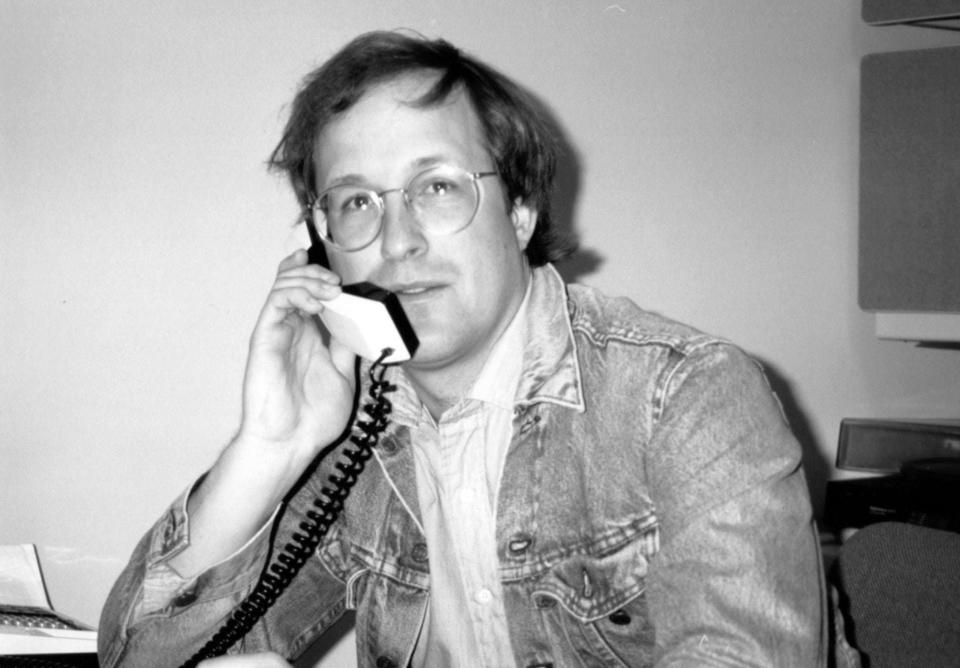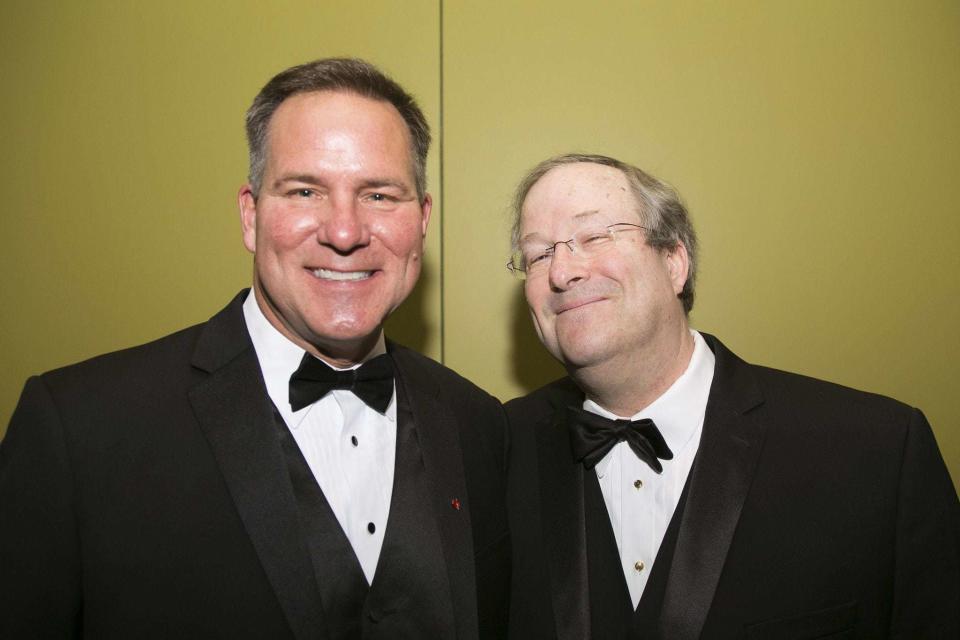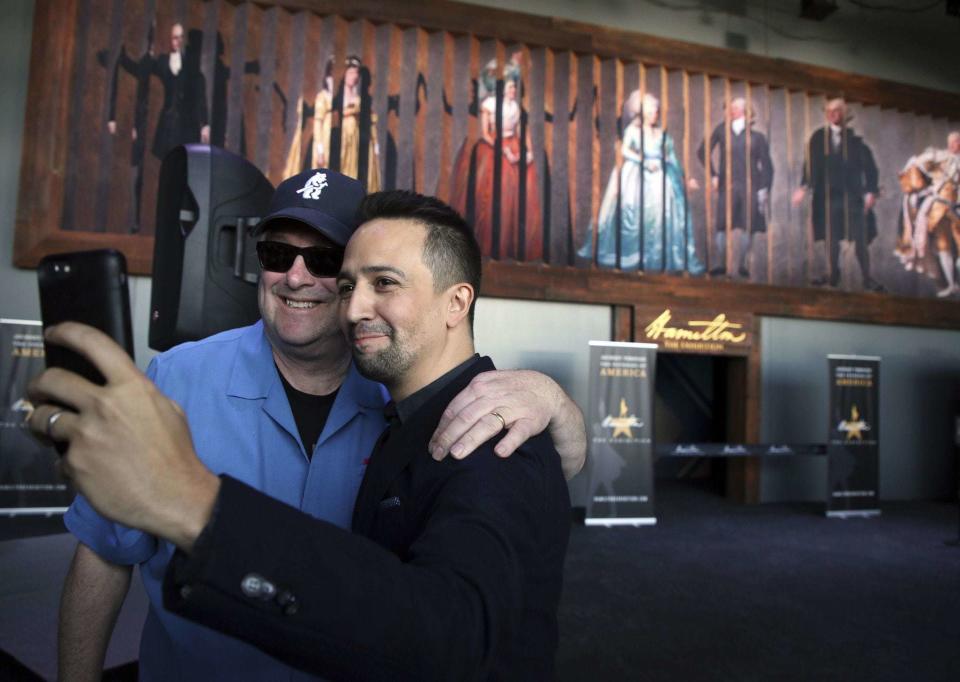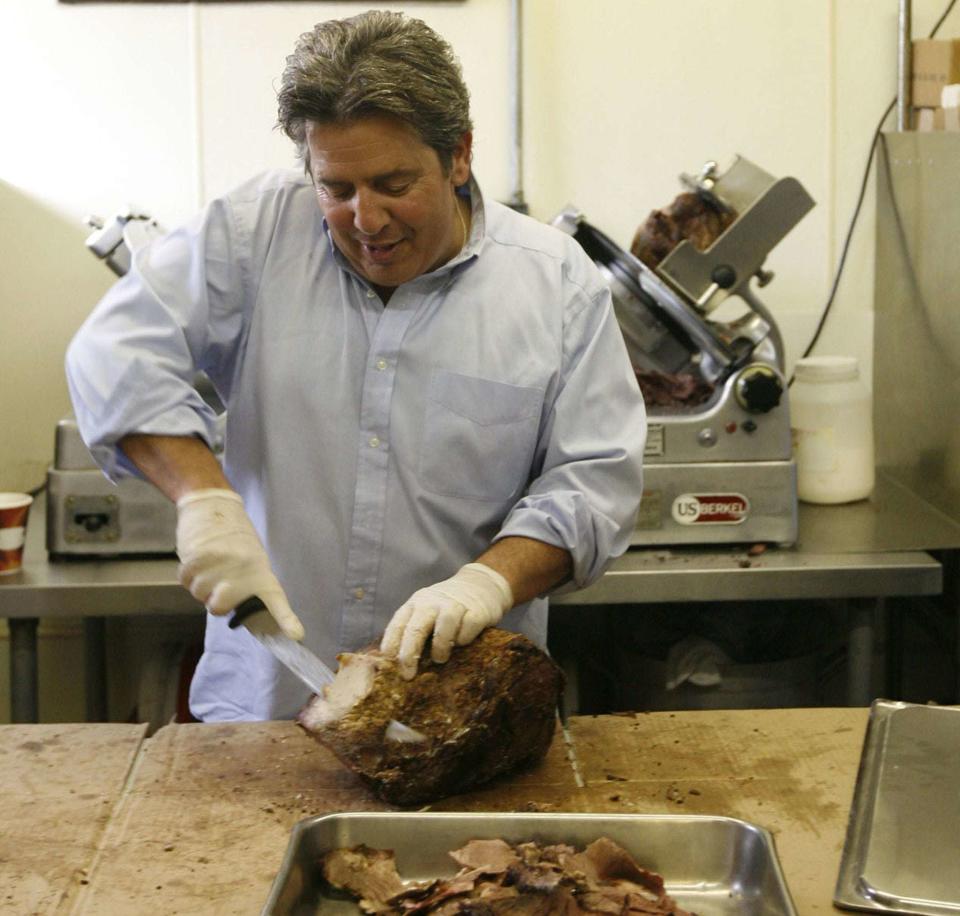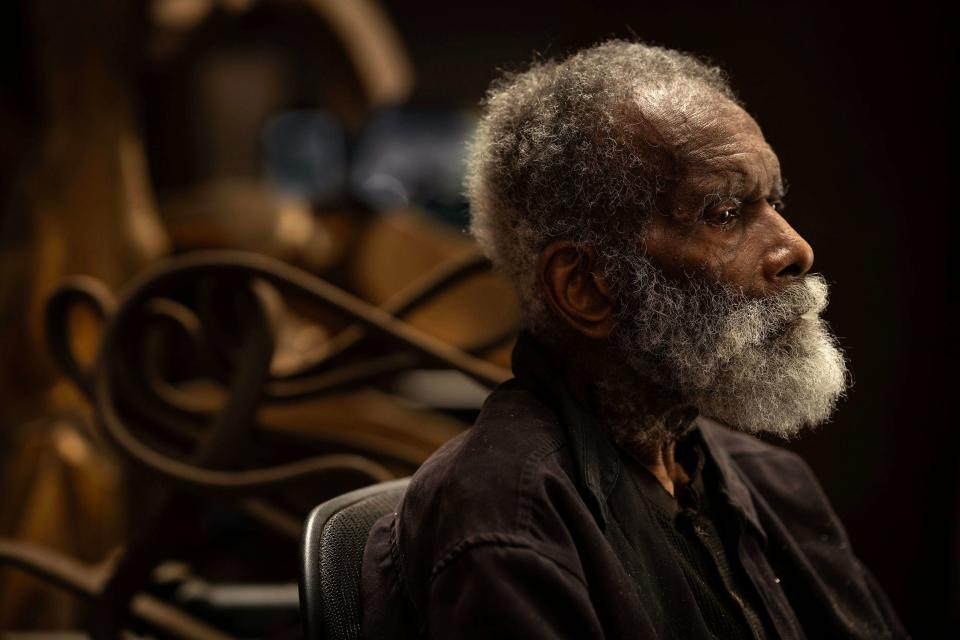In memoriam: Amid the holidays and hopes for a new year, we remember who and what we lost in 2023
- Oops!Something went wrong.Please try again later.
- Oops!Something went wrong.Please try again later.
- Oops!Something went wrong.Please try again later.
- Oops!Something went wrong.Please try again later.
- Oops!Something went wrong.Please try again later.
- Oops!Something went wrong.Please try again later.
Every year, amid the holiday hoopla, music and general merriment, we must concern ourselves with the shadow of mortality. The end of each year brings memories of the people who have vanished during the previous 12 months — and places and things too, and I ask my arts and entertainment colleagues to recall some of what we lost. These annual lists could easily go on and on but they are shorter, subjective gatherings that, in a fashion, tell you something about the people writing them. You will find some surprises here, as in “I did not know so-and-so died,” but also some pleasant memories, some smiles, and you might even be compelled to travel the internet, where “life” goes on forever. So, read what we have to say, some personal memories and regrets and, as I tell you every December, shed a tear if you must, but also know that life goes on and this coming new year, like any new year, is filled with promise.
From Tribune critic Chris Jones
A founding father of a theater of our own, Ernest Perry Jr. (who died Nov. 23 at age 76) was a ubiquitous presence at the Goodman Theatre, especially in the waning years of the 20th century. He did August Wilson (“Two Trains Running,” “Ma Rainey’s Black Bottom”), David Mamet (“Edmond”), William Shakespeare (“The Merchant of Venice,” “Romeo and Juliet,” “As You Like It”) George Bernard Shaw (“Heartbreak House”) and Eugene O’Neill (”The Iceman Cometh”). But it was most fun to see him stick his teeth into new work by the likes of Regina Taylor or Cheryl L. West. Born and raised in Evanston, Perry was not only a busy Chicago actor but an excellent performer, relentless where necessary, funny when allowed and always, but always, part of an ensemble. When he died, many younger actors reacted with palpable anguish: a quietly crucial mentor had been lost.
The retro term “classy” clung on to Lia Mortensen (June 7, age 57), a Chicago actor who always seemed just a step away from being a fancy Hollywood star. Smart, glamorous and intuitive on stage, with Mortensen’s death Chicago theater lost one of its most skilled players, a witty, droll performer most at ease with the likes of Tom Stoppard or Lanford Wilson. In 2012, Mortensen returned to a Brian Friel play, “Faith Healer” after 18 years, remounting the same production with a fine actor, Si Osborne, who had been (but was no longer) her husband. Given that the play was about the challenges of maintaining a personal relationship in the context of a life in the theater, it was a creative act of exceptional courage.
Oh, how I will miss the great Barry Humphries (April 22, age 89). I was a big enough fan of his Dame Edna Everage to fly to Washington, D.C., to watch the great dame’s final performance. No interview subject was more fun than Dame Edna, given her habit of doing research on the interviewer, allowing her to poke fun and massage a journalistic ego rather than answer actual questions. Over the years, and there were many, the routine would start:
“Hello, Chris, it’s Barry.”
“Hello Barry, is Dame Edna there?”
(The sound of a voice calling down a long hallway, as if in some extravagant Australian mansion, a couple of coughs followed by some rustles of fabric, and then ...)
“Hello possum, how are you, darling?”
From contributing critic Hannah Edgar
The year 2023 took one more from us in its twilight hours: sculptor Richard Hunt (Dec. 16, age 88). A lifelong Chicagoan, Hunt taught himself to weld as a student at the School of the Art Institute, combing through alleys and junkyards for scrap metal. His sculptures’ earthiness and asymmetry commanded critical attention right away: Hunt was still attending SAIC when the Museum of Modern Art in New York acquired one of his student works, in 1957. In 1971, while still in his 30s, Hunt became the first African American sculptor honored with a retrospective at the same museum.
Hunt’s sculptures eventually became bigger and sleeker, symphonies of curved lines and larger-than-life grandeur. Few artists have made such a singular mark on our cityscape, and his public installations in Chicago alone are too legion to list. Some essentials: The “Light of Truth” Ida B. Wells National Monument in Bronzeville, “Flight Forms” at Midway Airport, “Jacob’s Ladder” at the Woodson Regional Library, “Eternal Flame of Hope” near Soldier Field and “Freeform” on the Michael A. Bilandic Building downtown.
Hunt spent part of his childhood in Woodlawn, where Emmett Till also lived with his family, just two blocks away, before his lynching in 1955. The event would change the course of Hunt’s life and art. After attending Till’s open-casket funeral in 1955, Hunt completed one of his first titled welded sculptures, “Hero’s Head,” a metallurgic elegy for Till.
The late artist surely would have approved, then, that a monument to Till would be among his last public artworks: Hunt’s “Hero Ascending” will be installed at the Till family home in 2024. Other works to be unveiled posthumously include “Rise Up,” a George Floyd memorial at Morehouse College in Atlanta, “Book Bird,” on the campus of the Obama Presidential Center in Jackson Park, and his own memorial sculpture, “Spirits Ascending,” in Oak Woods Cemetery.
A lifelong lover of classical music, Hunt was a regular fixture at Music of the Baroque concerts. That Chicago is home to this nonpareil early music organization at all is thanks to Thomas Wikman (Oct. 10, age 81). The organist and conductor led the first Music of the Baroque concert at Hyde Park’s Church of St. Paul & the Redeemer, where he worked as choir director, in 1972. That first concert, of Bach cantatas, sold out. In a little more than a decade, Music of the Baroque had grown to an annual budget of nearly $1 million and retained eight employees. If impressive now, it was even more so then for an American musical organization solely dedicated to 16th-to-18th century repertoire.
Wikman led the organization until 2001, succeeded by current music director Dame Jane Glover. But the group’s success, and most especially its ambition, still bear his mark. Said long-time baritone Jan Jarvis in a remembrance on the organization’s website, “He brought out a specific sound and rhythmic innovations in our ensemble that no one else was doing.”
Speaking of pioneers plugging musical gaps in this city: the Tribune did not have a jazz critic of its own until Harriet Choice (July 12, age 82) took on that title in 1969. Choice wrote in that capacity for the Tribune until the early 1980s, one of very few women then or since to do so at a major newspaper. Choice also edited the Tribune’s Sunday arts section and later became its executive travel editor.
The same year her byline first appeared in the Tribune, Choice had the idea to start the Jazz Institute of Chicago, an essential engine in jazz programming (the Chicago Jazz Festival may never have existed without her) and education. Choice remained involved with JIC for the rest of her life, most recently co-chairing its oral history archive.
Harrison Bankhead (April 5, age 68), the venturesome bassist and cellist, was a member of the Association for the Advancement of Creative Musicians (AACM), a regular at Fred Anderson’s dearly departed Velvet Lounge and beloved collaborator of Roscoe Mitchell, Von Freeman, Dee Alexander, and countless other improvising musicians in Chicago.
Bassist Richard Davis (Sept. 6, age 93) died in Madison, where he’d lived as a longtime professor at the University of Wisconsin. As a young man, Davis absorbed the best musical pedagogy the city had to offer: he passed through Capt. Walter Dyett’s talent factory at DuSable High School, played in the Chicago Symphony Youth Orchestra and studied with CSO bassist Rudy Fahsbender. That multifaceted upbringing surely primed Davis for a boundless career. He was named an NEA Jazz Master in 2014.
When James Yancey “Tail Dragger” Jones (Sept. 4, age 82) died, Chicago lost one of its last echt bluesmen. Born James Yancey Jones in rural Arkansas, Jones made his way to Chicago in 1966, where his throaty, uncompromising voice and stage antics — he would sometimes crawl around onstage, earning him the nickname “Crawlin’ James” — caught the attention of his idol Howlin’ Wolf. “Tail Dragger,” as Jones was later known, was a jab by Wolf himself. “I was late, and my time was bad,” Jones admitted.
Despite Jones’ longevity in Chicago’s blues scene, his recording legacy, most of it on Delmark Records, picked up in the 1990s, after Jones was released from prison. In 1993, Jones shot and killed fellow blues artist Boston Blackie after a payment dispute related to the Chicago Blues Festival earlier that year; Jones claimed self-defense and served 17 months in prison. In 2018, Jones performed for inmates at Cook County Jail, in a visit documented by WGN. A documentary about his life and career was released last year.
“To me, blues is not suffering,” Jones told the Daily Southtown in 2020. “When I’m on the bandstand, I feel happy. There’s no pain to me. It’s something I love.”
Pioneering European free jazz musician Peter Brötzmann (June 22, age 82) was more of an honorary son of Chicago, but still a son: the city, he apparently said, reminded him of his German hometown, Wuppertal. During a Dec. 17 memorial celebration at Constellation, writer and curator John Corbett estimated that, at his peak, Brötzmann performed in Chicago some six times a year.
As Corbett tells it, Brötzmann went to an NRG Ensemble performance in the mid-’90s and pricked his ears at the fearless saxophonist leading the band. “Who’s the little guy?” Brötzmann asked Corbett at the break.
That would have been Mars Williams (Nov. 20, age 68). The two blazing reedists would collaborate for the next two-plus decades, including in Brötzmann’s Chicago Octet and Tentet. Williams was perhaps most widely known as a member of the Psychedelic Furs, the Waitresses and Liquid Soul but balanced a rare dual career in the mainstream and outré. Besides NRG, he played with the free-jazz quartet Extraordinary Popular Delusions, the Vandermark Five, his own band Witches & Devils … the projects, named and unnamed, are too numerous to count. And this time of year doesn’t — may never — feel complete without “An Ayler Xmas,” Williams’ out-there reinterpretations of holiday tunes by way of free-jazz saxophonist Albert Ayler.
In photos for a Tribune feature about his life and music, Williams requested that the shoot take place at May Chapel, in Rosehill Cemetery, where he had a gig scheduled in late October. The performance was canceled when Williams’ condition worsened; instead, the small chapel became the site of his memorial service. As mourners leave May Chapel, they pass under verses by English poet and essayist Anna Lætitia Barbauld, engraved above the doorway:
Say not Good night, but in some brighter clime
Bid me Good morning.
From Tribune writer Darcel Rockett
A list: Frances Sternhagen (Nov. 27, age 93); Marty Krofft (Nov. 25, age 86); Richard Moll (Oct. 26, age 80); Suzanne Somers (Oct. 15, age 76); Burt Young (Oct. 8, age 83); Dick Butkus (Oct. 5, age 80); Michael Gambon (Sept. 27, age 82); Bob Barker (Aug. 26, age 99); Ron Cephas Jones (Aug. 19, age 66); Paul Reubens (July 30, age 70); Inga Swenson (July 23, age 90); Tina Turner (May 24, age 83); Tony Bennett (July 21, age 96); Jim Brown (May 18, age 87); Jerry Springer (April 27, age 79); Lance Reddick (March 17, age 60); Burny Mattinson (Feb. 27, age 87); Richard Belzer (Feb. 19, age 78); Barbara Bosson (Feb. 18, age 83); Lisa Loring (Jan. 28, age 64); Cindy Williams (Jan. 25, age 75) and Adam Rich (Jan. 7, age 54).
All of these people played a part in my pop culture upbringing. Through their presence on screen and on radio, I became a fan of their work, their words, their personas and their voices. The world is dimmer without them, granted. But at least we can continue to revisit their legacies whenever we want by just pressing “play.”
One more notable loss: the end of Google Assistant’s “animal of the day” command. You were provided with an animal a day with information about that animal alongside a picture. On Nov. 27, the command came to an end. As an aunt of little nephews, this command would often start our daily routine during the pandemic. After we read a book on animals, it would anchor ongoing discussions. The other day, my 3-year-old nephew pointed at the icon that stated the command was no more and he looked at me as if I could fix it; like others drank coffee to get them started in the morning, he used the animal of the day as each day’s beginning. There inevitably will be other commands and new technology that arise, but for my little part of the world, the animal of the day command will forever live in our hearts and minds.
From Tribune critic Michael Phillips
Burt Bacharach (Feb. 8, age 94): Fellow composer and hitmaker Sammy Cahn used to say the composer behind “What the World Needs Now is Love” was the first songwriter he knew who didn’t look like a dentist. The next time you hear “Walk on By” or “Make It Easy on Yourself,” ask yourself: Is the world a little sweeter for those songs having been written, or isn’t it?
Raquel Welch (Feb. 15, age 82): The endlessly exploited movie star spent the first two years of her life in Chicago’s Andersonville neighborhood before her family headed to San Diego. After the success of “One Million Years B.C.,” she knew (as she wrote in her memoir) that she’d “have to fight to stay afloat in the most treacherous of identities: the role of sex symbol. There I was, stranded and easy prey in that desolate realm of overnight success. But I was nobody’s pushover.”
Harry Belafonte (April 25, age 96): Singer, actor, activist, superstar. As I wrote, his death “isn’t a cause for grief; he did too much that brought joy to too many for that. He did all he could in his century-minus four, and that is the best of all possible legacies.”
Treat Williams (June 12, age 71): He fell just short of the movie star status he deserved, but as I wrote, “that’s rarely about the actors, or the acting; stardom often lies a bridge too far, even for even a fine and consistently valuable actor such as Williams.”
Alan Arkin (June 29, age 89): Hilarious, unique, Chicago improv-trained and the world was happier for it. As Second City director of comedy studies and Columbia College Chicago professor Anne Libera told me: “He was an astonishing improviser, an amazing actor, and he made discoveries that very few of his generation could touch. And that no one has made since.”
William Friedkin (Aug. 7, age 87): The Chicago-born and bred director of “The French Connection,” “The Exorcist” and many more. As I wrote, “To the end, when he spoke, he sounded like Chicago and nowhere else. Specifically, the intersection of Foster Avenue and Sheridan Road, where he began his childhood in a one-bedroom apartment before life, and the movies, expanded his horizons.”
Richard Roundtree (Oct. 24, age 81): He was Shaft in “Shaft,” and many more characters in many more film, TV and stage performances. From the Tribune appreciation: “If MGM had its way, Shaft — created by novelist Ernest Tidyman, who cowrote the 1971 screenplay — would’ve gone to a white actor. And history would not have been made.”
Norman Lear (Dec. 5, age 101): A genuine giant of television, the producer, writer and director brought a social conscience to 1970s situation comedy and made it easier for those who came after him, working in writers’ rooms more diverse than his own, to look the country in the eye, tell the truth, and get the laughs on cue.
From Tribune writer Christopher Borrelli
Barbara Rossi (Aug. 24, age 82) believed in painting what she could not see. She imagined she was pulling in landscapes and thoughts floating free in a universe of realities, as she liked to put it. “I just keep rolling along on my eyeballs,” she told an interviewer. She grew up in Berwyn and became a nun, though by the end of the 1960s, Rossi was brought into the surrealist fold of Chicago Imagists, the rowdy collective of like-minded local artists that included Gladys Nilsson, Jim Nutt, Ed Paschke and Suellen Rocca. After graduating from the School of the Art Institute, she taught there for many decades, known for her cartoony, rounded figures, barely recognizable as bodies.
Bits of bloated belly and feet might be evident, but the results were closer to abstracted parade balloons. Even among the Imagists, a group hard to categorize, Rossi seemed guided by spirits, telling the Tribune her masterpieces arrived “of their own accord.” She was inspired by ice cream cones and the history of Indian art alike, and if all of this sounds like a recipe for a billowing randomness, her paintings also belied the intricateness it took to create them. Though Rossi also worked in printmaking and fabrics, her preferred canvas was Plexiglas. She painted on it backward, meticulously, leaving bits of hair and sequin inside works, crafting near 3D images that cast shadows and reflections. You wanted to reach into the art of Barbara Rossi, and learn what was on the other side.
Bill Pinkney (Aug. 31, age 87), decided he would prove to his grandkids and the children at his South Side grade school how far discipline and ambition could carry a person. He was in his 50s by then. He bought a 47-foot sailboat and named it Commitment. He had been a Navy X-ray technician and a marketing executive at Revlon and Chicago’s Johnson Products, and finally an information officer in Chicago’s Department of Human Services. But after being laid off in 1984, he reached back into his childhood: He had loved a book titled “Call it Courage,” about a Polynesian boy afraid of the ocean. Inspired by that memory, he decided to sail solo around the world.
Rather than sail through the Panama and Suez canals, Pinkney did it the much harder way, passing the southernmost Cape Horn and Cape of Good Hope in South Africa. He became the first Black sailor to do so. He asked Chicago and Boston teachers to track him for classroom lessons on geography and history (more than 150 schools did). Then he left Boston Harbor in 1990. He traveled 32,000 miles, for 22 months. His boat listed dangerously to its side in storms. He weathered hurricanes and lightning strikes and lack of sleep; to pass the imposing Cape Horn, where the Atlantic and Pacific mash into a maelstrom, he stayed at the helm for 48 straight hours.
On Valentine’s Day in 1992, he returned to Boston in a storm. He dedicated the rest of his life to education, writing about his journey for children, retracing the Middle Passage that brought African slaves to the Americas and even building a replica of the Amistad, the schooner that was commandeered in 1839 by West African slaves headed for work in the Caribbean plantations. Pinkney called ocean sailing “the great equalizer.” He told PBS, “The sea doesn’t care what your economic status is. Your religion, your nationality, your sex, it doesn’t care what you think. It cares (about) one thing: I am the sea.”
You probably don’t recognize the name DJ Casper. Or his other nickname, Mr. C the Slide Man. Or the man’s birth name, Willie Perry Jr. (Aug. 7, age 58) But you know his song. You’ve heard it many times. Perry made “Cha Cha Slide,” that early millennium line dance — ”Slide to the left ... Slide to the right ... Crisscross ... Cha cha real smooth” — that’s become a staple of workout classes, sports stadiums, weddings, bar mitzvahs. Like other one-hit wonders, he rode his solitary smash as far as it carried him, and eventually interest dried up. Still, it carried him far.
Perry grew up around Woodlawn, attended Hyde Park High School, and spent years as a roller-skating DJ and MC and lip-sync performer on the South Side club circuit. “Cha Cha Slide” started with the humblest of ambitions: Perry made it for a nephew who taught step aerobics at Bally Total Fitness. But the song became a local word-of-mouth favorite, and Perry sold copies out of his trunk. Then a new version went into rotation on WGCI-FM, and Universal Records signed him. The song never went higher in the United States than No. 83 on the Billboard Hot 100 but it became a ubiquitous classic, appearing in Pepsi and McDonald’s commercials, children’s movies and “Saturday Night Live” sketches; for a time, Perry was even opening for one of his old lip-sync go-to’s, James Brown. “Everything hit all at once,” Perry told WTTW.
Then everything went away. Casper tried to recapture the magic with “Island Slide” and “Social Distancing Slide,” but nothing stuck. Except “Cha Cha Slide,” which never really went away. Perry created one of Chicago’s most-recognized cultural exports and it was plenty.
From Tribune critic Nina Metz
It’s not an easy thing to convey both warmth and neurotic insecurity. Which is why Matthew Perry (Oct. 28, 54) became so vital to the success of “Friends.” His character Chandler was always the guy with a sarcastic aside, but he was also deeply and sincerely needy. And when he finally fell in love, he jumped in with two feet. He single-handedly made a certain vocal emphasis mainstream — could we be more appreciative? Off screen, Perry’s struggles with addiction were well known, which he eventually talked about openly and with vulnerability. You rooted for him. Two years ago, when the cast of “Friends” came together for a televised reunion, he was the one person to push the conversation into potentially uncomfortable but meaningful directions. He talked about the pressure to generate a laugh and the anxiety he felt if a joke didn’t land. His co-stars were surprised to hear this, but no one asked him about it any further. There was so much about Perry we probably didn’t know. But the joy he gave us as an actor will be missed.
Any remaining shred of respect for studio bosses: Between some odious PR during the strike (the endgame, according to one anonymous studio executive, was to allow things to “drag on until union members start losing their apartments and losing their houses”) and the revelation that HBO head honcho Casey Bloys had tasked employees with creating fake Twitter accounts to attack TV critics, it was an embarrassing year for media execs. Even Bloys’ boss had a mortifying PR moment of his own this year, when his team pushed GQ to pull a column with the headline: “How Warner Bro. Discovery CEO David Zazlav Became Public Enemy Number One in Hollywood.” Heaven forfend that a CEO weather some criticism! Despite a business that’s built on image-making, it’s almost comical that the C-suite elite are so bad at crafting a better image for themselves.
From A+E editor Doug George
It’s been important to report on in the past year all the challenges being faced by Chicago’s artists and arts companies — but losses were far from the only story. Second City had hit shows, iO resumed in-person improv classes, there are new homes for American Blues Theater and the Magic Parlour, new leaders at Chicago Shakes and the Goodman. Seeing movies at the cinema is far from dead. Live music had a massive summer. Teatro ZinZanni returned and Chicago appointed its first Poet Laureate in April.
What’s more, not every loss points toward misfortune. Some are just, simply, losses. Tribune contributor Emily McClanathan reported in February on the final show for First Folio Theatre in Oak Brook. Chicago and the western ‘burbs lost a theater that for decades had put on Shakespeare, Noël Coward and plays such as the 2006 world premiere of “The Madness of Edgar Allan Poe,” in summer outdoors at the Mayslake Peabody Estate and in winter inside in the mansion. Most of First Folio’s plays were directed by women. Executive director David Rice noted that while endings are sad, the theater founded in 1997 by him and his late wife Alison C. Vesely was never expected to make it out of its first few seasons. It had many loyal subscribers.
When you read the names of musicians who died in the past year, it always seems like a heavy toll. No exception for 2023. Tina Turner (May 24, age 83), of course, but also from the world of popular music, in addition to several mentioned above, Lisa Marie Presley (Jan. 12, age 54), guitar master Jeff Beck (Jan. 10, age 78), singer/songwriter David Crosby (Jan. 18, age 81), balladeer Gordon Lightfoot (May 1, age 84), Tony Bennett (July 21, age 96), Sinead O’Connor (July 26, age 56), Jimmy Buffett (Sept. 1, age 76), now in paradise, and Rudolph Isley (Oct. 11, age 84), of those famous brothers. Just to name a few of many.
From Tribune columnist Rick Kogan
For the generation of kids who came into their teens during the early 1960s, the soundtrack of their nights came from transistor radios buried under pillows, the music slightly muffled but DJ Dick Biondi (June 26, age 90) loud and clear and unforgettable. He spent more than six decades in the radio business; the couple dozen stations that employed his rapid-fire, enthusiastic delivery; his induction into the Radio Hall of Fame and other honors that came his way. He was a major influence on radio stars who came after him.
He was the first U.S. DJ to play the Beatles (“Please Please Me”) and was tireless in off-air activities too, appearing at ribbon cuttings, proms, sock hops and charity events. While most DJs, then and now, were loath to mingle in this fashion, Biondi did so with relish, endearing himself to packs of teens who became devoted listeners.
One of them was Pam Enzweiler-Pulice, who grew up in Villa Park and told me, “Dick was the voice of my youth and far beyond.” She has made a movie of his life and career. She calls her “The Voice that Rocked America: The Dick Biondi Story,” “a labor of love ... I feel he was a national treasure and it has been an honor to know him. He was such a humble man. Maybe that’s one of the reasons his impact and influence have been underappreciated.”
Name a star or celebrity of the last 40 years and it’s likely that person was the subject of Bill Zehme’s (March 26, age 64) keen mind and artful writing, in such magazines as Rolling Stone, Playboy, Vanity Fair and Esquire, and in bestselling books in collaboration with Jay Leno and Regis Philbin, and about Andy Kaufman and Frank Sinatra.
“Bill was a great writer but he was an even greater person,” said Tom Dreesen of suburban Harvey, for years Sinatra’s opening act. “Humble about his writing skills, and more interested in knowing about you than you knowing about him.”
Zehme had been diagnosed a decade before colorectal cancer, riding a medical roller coaster of hope and despair that ended in Weiss Memorial Hospital. “It was very hard,” said actress Jennifer Engstrom, with whom Zehme lived and who had been his constant companion for more than a decade. “He always hated deadlines and I think he wanted to wait until his sister and I were both there in the room before he said goodbye. He was a gentleman to the end.”
Lin Brehmer (Jan. 22, age 68), the hugely popular, buoyant and beloved host on Chicago radio’s WXRT-FM 93.1 died of prostate cancer on a snowy Sunday. On air his fellow WXRT host and friend Terri Hemmert told listeners, “We must inform you that we all lost our best friend … He passed early this morning, peacefully, with his wife (Sara) and son (Wilson) by his side.”
Brehmer had been on the air here since 1991, as morning drive host until 2020, when he moved to midday host. A graduate of Colgate University in New York, he began his radio career in Albany (where he was known as “The Reverend of Rock ‘n’ Roll”), before arriving here to become music director at WXRT in 1984.
Brehmer and his wife, Sara Farr, were college sweethearts but dated for 16 years before marrying. “We didn’t want to ruin a good thing,” she told me. “I learned very early on that I would have to share Lin with thousands of others. I understood, and was happy to do so because there really was no difference between the man on the radio and the man I knew.”
A devoted Cubs fan and well known in the area, Brehmer was the most accessible of “celebrities,” posing for photos, engaging in conversations with fans at a variety of events of the charitable and entertaining type. In addition to his personality-touched song selections as a DJ, he was at his erudite best in his own artfully written on-air essays, which he called “Lin’s Bin.” He was known self-effacingly as “your best friend in the whole world,” but his death brought intense poignancy to another of his catchphrases, one with which he ended each daily program: “Never take anything for granted, it’s great to be alive.”
